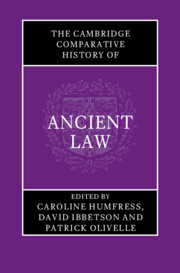91 results
Index
-
- Book:
- The Cambridge Comparative History of Ancient Law
- Published online:
- 09 May 2024
- Print publication:
- 30 May 2024, pp 670-706
-
- Chapter
- Export citation
Bibliography
-
- Book:
- The Cambridge Comparative History of Ancient Law
- Published online:
- 09 May 2024
- Print publication:
- 30 May 2024, pp 615-669
-
- Chapter
- Export citation
Abbreviations
-
- Book:
- The Cambridge Comparative History of Ancient Law
- Published online:
- 09 May 2024
- Print publication:
- 30 May 2024, pp xviii-xxiv
-
- Chapter
- Export citation
3 - Legal Science
-
-
- Book:
- The Cambridge Comparative History of Ancient Law
- Published online:
- 09 May 2024
- Print publication:
- 30 May 2024, pp 73-145
-
- Chapter
- Export citation
Contributors
-
- Book:
- The Cambridge Comparative History of Ancient Law
- Published online:
- 09 May 2024
- Print publication:
- 30 May 2024, pp ix-x
-
- Chapter
- Export citation
Maps
-
- Book:
- The Cambridge Comparative History of Ancient Law
- Published online:
- 09 May 2024
- Print publication:
- 30 May 2024, pp viii-viii
-
- Chapter
- Export citation
Contents
-
- Book:
- The Cambridge Comparative History of Ancient Law
- Published online:
- 09 May 2024
- Print publication:
- 30 May 2024, pp v-vi
-
- Chapter
- Export citation
Additional material
-
- Book:
- The Cambridge Comparative History of Ancient Law
- Published online:
- 09 May 2024
- Print publication:
- 30 May 2024, pp xvi-xvi
-
- Chapter
- Export citation
Preface
-
- Book:
- The Cambridge Comparative History of Ancient Law
- Published online:
- 09 May 2024
- Print publication:
- 30 May 2024, pp xi-xv
-
- Chapter
- Export citation
Figures
-
- Book:
- The Cambridge Comparative History of Ancient Law
- Published online:
- 09 May 2024
- Print publication:
- 30 May 2024, pp vii-vii
-
- Chapter
- Export citation
11 - Commerce and Contracts
-
-
- Book:
- The Cambridge Comparative History of Ancient Law
- Published online:
- 09 May 2024
- Print publication:
- 30 May 2024, pp 565-597
-
- Chapter
- Export citation
Additional material
-
- Book:
- The Cambridge Comparative History of Ancient Law
- Published online:
- 09 May 2024
- Print publication:
- 30 May 2024, pp xvii-xvii
-
- Chapter
- Export citation
1 - Orientation
-
-
- Book:
- The Cambridge Comparative History of Ancient Law
- Published online:
- 09 May 2024
- Print publication:
- 30 May 2024, pp 1-19
-
- Chapter
- Export citation
10 - Property
-
-
- Book:
- The Cambridge Comparative History of Ancient Law
- Published online:
- 09 May 2024
- Print publication:
- 30 May 2024, pp 512-564
-
- Chapter
- Export citation
2 - Law as Text
-
-
- Book:
- The Cambridge Comparative History of Ancient Law
- Published online:
- 09 May 2024
- Print publication:
- 30 May 2024, pp 20-72
-
- Chapter
- Export citation
Copyright page
-
- Book:
- The Cambridge Comparative History of Ancient Law
- Published online:
- 09 May 2024
- Print publication:
- 30 May 2024, pp iv-iv
-
- Chapter
- Export citation
Maps
-
- Book:
- The Cambridge Comparative History of Ancient Law
- Published online:
- 09 May 2024
- Print publication:
- 30 May 2024, pp xxv-xxxviii
-
- Chapter
- Export citation

The Cambridge Comparative History of Ancient Law
-
- Published online:
- 09 May 2024
- Print publication:
- 30 May 2024
4 - What’s in a Name?
-
-
- Book:
- Reasons and Context in Comparative Law
- Published online:
- 27 April 2023
- Print publication:
- 11 May 2023, pp 65-93
-
- Chapter
- Export citation
Control of Supreme Courts in Early Modern Europe. Edited by I. Czeghun, J. Antonio López Mevot and A. Sánchez Aranda. [Berlin: Duncker & Humblot, 2018. 323 pp. Softback €89.90. ISBN 978-34-28148-08-0.]
-
- Journal:
- The Cambridge Law Journal / Volume 78 / Issue 3 / November 2019
- Published online by Cambridge University Press:
- 15 November 2019, pp. 663-664
- Print publication:
- November 2019
-
- Article
- Export citation



